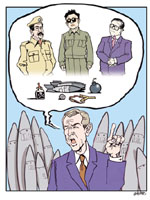To the Editor
Back to Contents of Issue: January 2004
|
|
|
|
by Thomas T. Winant / Joe M. Michael Sasanuma |
|

Dear Mr. Kelts,
Regarding your feature story on the imprisonment of Nick Baker ("And Justice for All ..." J@pan Inc, November 2003): Who said that Japanese criminal proceedings were "democratic?"
Perhaps only those who have never witnessed them, or those who swallow whole all kinds of myths about Japan. How naive. Japan is a reluctant member of the world club of leading nations with respect to laws designed to protect individual rights. And for foreigners, Japan offers virtually no protections whatsoever.
Are Japanese jails and prisons world class? Well, they are better than a whole lot of places, but anyone incarcerated in one for any length of time will come out with horror stories, and they would have every right to complain of food, physical abuse and more. Remember: The Japanese jails of today are direct descendants of the Japanese military prison camps of not all that long ago. The people are different, but their behavior isn't.
Is Mr. Baker innocent? Not by many standards. Was he duped? It makes no difference. The law does not differentiate between a violation intended or one that is not intended. The "penalty" may be mitigated by "intent," but guilt or innocence is not affected.
How many times in this era of airline flight have we been asked at check-in counters whether we have packed our own bag? Has anyone given us anything to carry aboard? Are we carrying anything in our bag that is prohibited? How many times have announcements been made at all airports warning us NOT to accept anything to carry on or off an airplane that is not our own?
Mr. Baker comes from England, from which Pan Am Flight 103 left on a rendevous with destiny over Lockerbie, Scotland in 1988. It has been established that the bomb on board that flight was handed to a female passenger by her terrorist boyfriend. That is WHY those questions are asked. Mr. Baker violated common sense Rule #1 when flying on an airplane.
What was Baker's state of mind when he passed through customs with the ill-fated bag? Was he drunk or hung- over? Was he doing it deliberately? Was he merely doing a favor, as he claims? None of that is germaine to a legal case, only to the penalty phase.
According to legal practice in Japan, all the descriptions I have read of the access given attorneys and family to Mr. Baker, all the habits of courtrooms in allowing access by media, and all the descriptions of what happened in the courtroom and in the police investigation are more than likely accurate.
Are these the way things are done in the UK or other Western countries? Not always (though one must recall what is happening in the US these days in Guantanamo, Cuba for a parallel in a "modern" country). Ought Mr. Baker, his family, friends, associates and the Western media have expected anything else? Not at all. The reactions of all these well-intentioned and outraged foreign citizens is based more on their ignorance of what Japan is really like than on any specific penalty that has been, and most certainly will be, visited on Mr. Baker in the near future.
Arrested suspects in Japan are not automatically given access to attorneys, nor does anyone have the "right" to visit them. Charges may be held in abeyance for days, weeks and even months while an investigation is undertaken. The nature of that investigation is determined exclusively by the local authorities, not by "outside" parties.
In this country, "justice" is determined by factors that may be quite outside the anticipations of foreigners, and as everyone in the process -- police, prosecuters and judges -- are all paid from the same budgets, what THEY decide will happen ... happens.
-- Thomas T. Winant
Dear Mr. Kelts,
In his essay, "A More Independent Japan" (J@pan Inc, September 2003), Yoneyuki Sugita bases his argument on two flawed assumptions: First, that Japan can and must gain greater independence in the international community -- and put an end to its "subservience" to the United States -- by taking a greater role in its regional security. And second, and far more importantly, that some adroit diplomatic maneuvering can convince Asian nations, particularly China and the Koreas, that Japan as a local security force is good for the region.
On the first point, while I am not in complete disagreement that Japan should take a more active role in its own security, ridding American involvement in Japanese security is both dangerous and unnecessary: dangerous because a military presence as large and strong as America's is the only true guarantee of security against two of the strongest and most dangerous military powers -- China, and particularly, North Korea.
The second point, however, is far more crucial. Sugita mentions the difficulty associated with Asian nations' inevitable resistance to Japan's defense and military buildup, and suggests that such a resistance must be overcome by developing "political leaders with enough talent and diplomatic tact to convince the Asian countries that Japan's enhanced armaments are for the benefit of the region."
The problem is that we are far more likely to see the Boston Red Sox win the World Series than China or the Koreas allowing for the militarization of Japan to the extent Sugita suggests.
I agree that Japan must become independent, but that independence cannot and should not be gained by less American involvement. The United States is not part of the problem. Japan lacks independence 50 years after the war because it has neither the desire nor the political skills to become more independent. And I see no chance of that changing amid the current political atmosphere.
-- Joe M. Michael Sasanuma
|
|
Note: The function "email this page" is currently not supported for this page.







